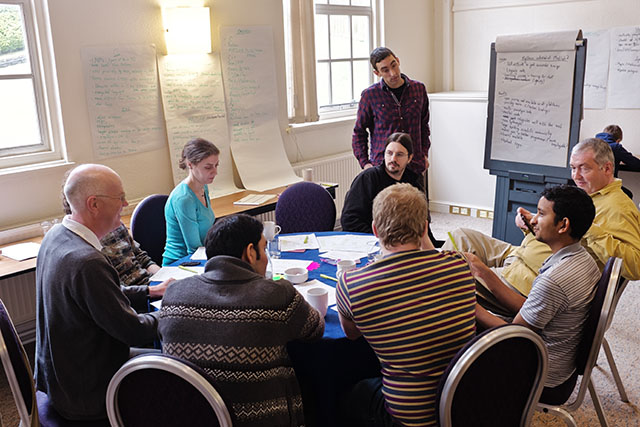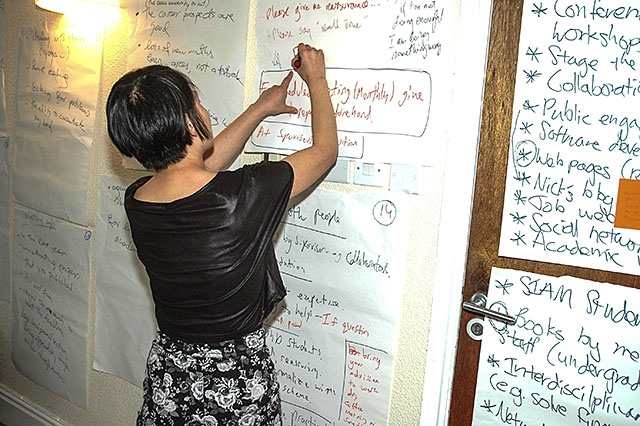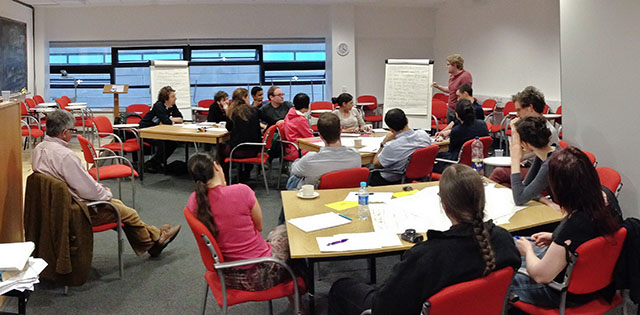The Numerical Analysis Group at the University of Manchester held a two-day Creativity Workshop at Shrigley Hall in the Cheshire countryside at the end of May 2013. All of the numerical analysis staff, postdocs and PhD students attended, along with two external collaborators from NAG and the Rutherford Appleton Laboratory.
After successfully piloting creativity workshops in 2010 under the Creativity@Home banner, the Engineering and Physical Sciences Research Council (EPSRC) now encourages holders of large grants to exploit creativity training.
A creativity workshop is an event in which a group of people tackle questions using a structured approach that encourages innovative ideas to be generated and carefully assessed and developed. It avoids the trap that we readily fall into of evaluating ideas too soon. Such an event needs an experienced facilitator who understands the nature of creativity and can skillfully guide the participants through the steps of tackling problems.
We were fortunate to have as our guide Dennis Sherwood, a leading expert on creativity who has worked with a wide variety of organizations including Manchester United, the National Grid and the European Commission, and who is recommended by EPSRC (indeed Dennis previously led an EPSRC-funded creativity workshop in 2010 that I attended as part of the Manchester CICADA team).

Dennis provides participants with a day of creativity training before a workshop. He quotes Koestler’s law (from The Act of Creation, 1964):
The creative act is not an act of creation in the sense of the Old Testament.
It does not create something out of nothing.
It uncovers, selects, reshuffles, combines, synthesizes, already
existing facts, ideas, faculties, skills.
The more familiar the parts the more striking the new whole.
He points out a problem with Koestler’s definition: it assumes that the sub-assemblies that are selected, reshuffled, and so on, are already explicitly there. In practice they are usually there within existing patterns, and may not be so obvious. He formulates Sherwood’s Law:
Creativity is the process of forming new patterns from pre-existing
component parts. The more the resulting pattern shows emergent
properties, such as those of beauty, utility, or value,
the more powerful the corresponding idea.
So creativity does not necessarily need new ideas (in any case, we usually don’t know if an idea is novel), but is about taking existing ideas and combining them in new and unanticipated ways. Dennis’s training days and his books 1, 2 explain the principles of creativity and the workshops themselves help put them into practice.

At our workshop a number of questions were addressed, including “Being a magnet for talent”, “The undergraduate curriculum”, “Software and programming languages”, “The PhD experience”, as well as strategic plans for the group and plans for future research projects and grant proposals.
By the end of an exhausting workshop many ideas had been generated and assessed and the group is now planning the next steps with the help of the detailed 94-page written report produced by Dennis.
Despite some understandable initial skepticism among some attendees new to the creativity workshop concept, everyone participated fully and enjoyed the experience. I thoroughly recommend such a workshop to other research groups.


Photo credits: Nick Higham (1,4), Dennis Sherwood (2,3).
